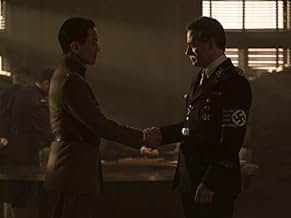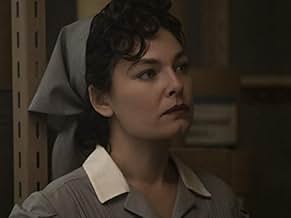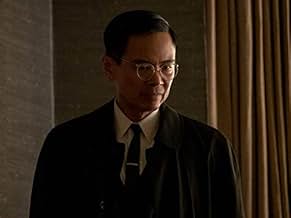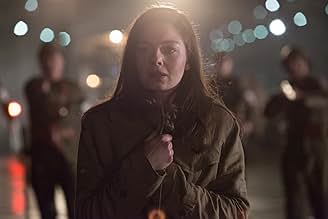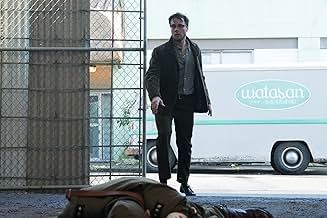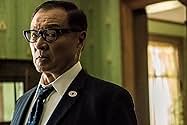Em uma América distópica dominada pela Alemanha nazi e pelo Japão imperial, uma jovem descobre um filme misterioso que pode ser a chave para derrubar regimes totalitários.Em uma América distópica dominada pela Alemanha nazi e pelo Japão imperial, uma jovem descobre um filme misterioso que pode ser a chave para derrubar regimes totalitários.Em uma América distópica dominada pela Alemanha nazi e pelo Japão imperial, uma jovem descobre um filme misterioso que pode ser a chave para derrubar regimes totalitários.
- Ganhou 2 Primetime Emmys
- 10 vitórias e 57 indicações no total
Explorar episódios
Resumo
Reviewers say 'The Man in the High Castle' is lauded for its intriguing alternate history concept, intricate characters, and meticulous world-building. The show's production design, cinematography, and detail-oriented approach are often commended. However, it faces criticism for pacing problems, especially in early seasons, and the addition of new characters deemed unnecessary or underdeveloped. The sci-fi elements, including alternate reality films, are both praised for their intrigue and faulted for their ambiguity. Some viewers are disappointed with character arcs and the direction of later seasons. Despite these issues, the series is widely seen as a visually captivating and intellectually stimulating journey through a grim alternate history.
Avaliações em destaque
Judge by the episode alone, without comparing the detail of the book it base on, it can be said that this show is of top quality, the grim, rusting, stressed and 60s styling photography, the camera angles and choice of equipment used at the time all looked extremely authentic.
That super sonic liner sequence was wonderful, it doesn't feel overly CGI for a TV show at all, then the nazi reception room sequence also shows the production quality in fine details.
It is a spy, psychological story with surreal elements and the show managed to capture that so far.
Any one with know a thing or two about ww2 history or a scifi fan would appreciate the effort spent here to make the world as authentic as possible in a TV budget.
If it was granted more episodes and the production quality remains, then it would easily be short list for the best mini series of 2015!
9/10
That super sonic liner sequence was wonderful, it doesn't feel overly CGI for a TV show at all, then the nazi reception room sequence also shows the production quality in fine details.
It is a spy, psychological story with surreal elements and the show managed to capture that so far.
Any one with know a thing or two about ww2 history or a scifi fan would appreciate the effort spent here to make the world as authentic as possible in a TV budget.
If it was granted more episodes and the production quality remains, then it would easily be short list for the best mini series of 2015!
9/10
I love the first 2 seasons. The plot was incredibly shocking. The actor Rufus Sewell (John Smith) is definitely the star of the series. A fascinating character that talks to you with his eyes. The first runner up is of course Joel de la Fuente as Inspector Kido. On the other hand, the weakness of the series is the character of Juliana Crain played by Alexa Davalos. She was ok in Season 1 but her character turned to annoying upto Season 4.
Despite some unnecessary scenes in Season 3 made just to satisfy the diversity dilemma of the West, I give this show 9 Stars for the great and unbelievable moments it provided.
Despite some unnecessary scenes in Season 3 made just to satisfy the diversity dilemma of the West, I give this show 9 Stars for the great and unbelievable moments it provided.
(Updated after Season 4).
It is the year 1962. Having lost World War 2, the United States is now occupied by Germany and Japan. Germany occupies the eastern states and Japan the western, with the Neutral Zone in between. When her sister is killed by the Japanese, Juliana Crain is sucked into the covert, dangerous world of the American Resistance. Opposing her and her comrades are the most ruthless forces the Nazis and Japanese have to offer, lead by Obergruppenfuhrer John Smith of the SS and Chief Inspector Kido of the Kempeitai. The Resistance's greatest hope appears to lie in films which show an alternate reality, a world where the US and its allies won WW2. While largely viewed as propaganda, these films could be more than that. At the centre of the manufacture and distribution of these films is one man, a figurehead in the Resistance: The Man in the High Castle.
Great, but not consistently so. Based on a novel by Philip K Dick (writer of the novels and short stories on which movies such as Blade Runner, Minority Report, A Scanner Darkly, Total Recall and Paycheck were based) and produced by Ridley Scott, the series had massive potential and initially lives up to it.
The central plot, an alternate history where the US loses WW2 and is occupied by the Germans and Japanese, is a very intriguing one and is very well done. The events that took place to reach the alternative reality and how the world and society now look and function all make sense. As a student of history, especially military history, I kept expecting something to not add up, or not fit in with history's possible paths, but it all fits in perfectly.
It became an enjoyable intellectual exercise for me, figuring out when the alternate history started deviating from the actual, and the events that took place, and didn't take place, for this to happen. As far as I can tell, the earliest deviation is in Dec 1941-Feb 1942 when the Japanese manage to invade and occupy Hawaii.
This alternate world provides some great plot developments and backgrounds for many intrigues: the American Resistance vs the Japanese and Germans; the friction between the Germans and Japanese and how they try to undermine each other, even potentially destroy each other, all while carrying on like loyal allies; the factional in-fighting within the Nazi Party and the Roman-style politics involved.
All the series needed was solid performances and no superfluous or hole-filled sub-plots and it would have been perfect. Easy enough to ask, right?
Yes, but alas, difficult to achieve.
After creating this great platform for drama and reimagining history and society, sub-plots are certainly not free of holes or contrivances. It is usually small things, but they are enough to undermine the credibility of the plot, e.g. 50 Japanese soldiers barge into a club to catch a fugitive, they all go in the front door, leaving other exits unguarded, fugitive escapes through the back door; man meets Yakuza boss, he's carrying a gun but henchmen don't frisk him, gun gets him out of a sticky situation.
Then there's the sci fi aspect involving the films. Admittedly, this is written by Philip K Dick so you should expect a sci fi angle, but I would have preferred the series to just concentrate on alternate history, and the drama stemming from that, rather than introduce the sci fi drama. It just seemed like an unnecessary add-on and a distraction.
Furthermore, performances are far from consistently solid. Alexa Davalos imbues Julianna Crain with a wimpy, anaemic, unengaging quality, far from what you'd want the main "good guy" in a series to be. Luke Kleintank makes Joe Blake boring and unlikeable. DJ Qualls is one of the more irritating actors in showbiz and generally the harbinger of a C-grade movie. Here he lives up to that reputation. I kept hoping the Japanese would shoot him and put me out of my misery. Cary-Hiroyuki Tagawa is so boring as Trade Minister Tagomi it feels like every scene he is in takes an hour. Admittedly his character is drawn that way too, so some fault has to lie with the writers.
On the flipside there is Rufus Sewell as John Smith. Sewell's performance stands like a mountain among knolls: he absolutely dominates the series, putting in the perfect performance as the ice cold, calculating, ruthless yet family-orientated Nazi. If it wasn't for Sewell and how well-constructed Smith's character was, the series would have fallen apart.
After three seasons it was all set up for a great finale. While the initial intrigue had worn off and the plot started to get more and more padded (largely by the multiple universes stuff) it still had heaps of potential. In addition, achieving the potential didn't seem difficult: explore the intrigues between Japan and Germany, with the resistance adding a bit of spice, and build up to a massive all-in conflict.
Sadly, however, Season 4 turns out to be easily the worst season of the series. The intrigues and battles are few and far between. The multiple universes aspect gets centre stage and there are heaps of sub-plots which don't really add anything. The ending is rather tame and unsatisfying.
Ditch the multiple universes, concentrate on the alternate history and the Germany vs Japan vs resistance struggle (throughout the series), create some engaging "good guy" characters, played by good actors and actresses, and you'll have a masterpiece. Instead, while still on the whole very good, this feels like a massive missed opportunity.
It is the year 1962. Having lost World War 2, the United States is now occupied by Germany and Japan. Germany occupies the eastern states and Japan the western, with the Neutral Zone in between. When her sister is killed by the Japanese, Juliana Crain is sucked into the covert, dangerous world of the American Resistance. Opposing her and her comrades are the most ruthless forces the Nazis and Japanese have to offer, lead by Obergruppenfuhrer John Smith of the SS and Chief Inspector Kido of the Kempeitai. The Resistance's greatest hope appears to lie in films which show an alternate reality, a world where the US and its allies won WW2. While largely viewed as propaganda, these films could be more than that. At the centre of the manufacture and distribution of these films is one man, a figurehead in the Resistance: The Man in the High Castle.
Great, but not consistently so. Based on a novel by Philip K Dick (writer of the novels and short stories on which movies such as Blade Runner, Minority Report, A Scanner Darkly, Total Recall and Paycheck were based) and produced by Ridley Scott, the series had massive potential and initially lives up to it.
The central plot, an alternate history where the US loses WW2 and is occupied by the Germans and Japanese, is a very intriguing one and is very well done. The events that took place to reach the alternative reality and how the world and society now look and function all make sense. As a student of history, especially military history, I kept expecting something to not add up, or not fit in with history's possible paths, but it all fits in perfectly.
It became an enjoyable intellectual exercise for me, figuring out when the alternate history started deviating from the actual, and the events that took place, and didn't take place, for this to happen. As far as I can tell, the earliest deviation is in Dec 1941-Feb 1942 when the Japanese manage to invade and occupy Hawaii.
This alternate world provides some great plot developments and backgrounds for many intrigues: the American Resistance vs the Japanese and Germans; the friction between the Germans and Japanese and how they try to undermine each other, even potentially destroy each other, all while carrying on like loyal allies; the factional in-fighting within the Nazi Party and the Roman-style politics involved.
All the series needed was solid performances and no superfluous or hole-filled sub-plots and it would have been perfect. Easy enough to ask, right?
Yes, but alas, difficult to achieve.
After creating this great platform for drama and reimagining history and society, sub-plots are certainly not free of holes or contrivances. It is usually small things, but they are enough to undermine the credibility of the plot, e.g. 50 Japanese soldiers barge into a club to catch a fugitive, they all go in the front door, leaving other exits unguarded, fugitive escapes through the back door; man meets Yakuza boss, he's carrying a gun but henchmen don't frisk him, gun gets him out of a sticky situation.
Then there's the sci fi aspect involving the films. Admittedly, this is written by Philip K Dick so you should expect a sci fi angle, but I would have preferred the series to just concentrate on alternate history, and the drama stemming from that, rather than introduce the sci fi drama. It just seemed like an unnecessary add-on and a distraction.
Furthermore, performances are far from consistently solid. Alexa Davalos imbues Julianna Crain with a wimpy, anaemic, unengaging quality, far from what you'd want the main "good guy" in a series to be. Luke Kleintank makes Joe Blake boring and unlikeable. DJ Qualls is one of the more irritating actors in showbiz and generally the harbinger of a C-grade movie. Here he lives up to that reputation. I kept hoping the Japanese would shoot him and put me out of my misery. Cary-Hiroyuki Tagawa is so boring as Trade Minister Tagomi it feels like every scene he is in takes an hour. Admittedly his character is drawn that way too, so some fault has to lie with the writers.
On the flipside there is Rufus Sewell as John Smith. Sewell's performance stands like a mountain among knolls: he absolutely dominates the series, putting in the perfect performance as the ice cold, calculating, ruthless yet family-orientated Nazi. If it wasn't for Sewell and how well-constructed Smith's character was, the series would have fallen apart.
After three seasons it was all set up for a great finale. While the initial intrigue had worn off and the plot started to get more and more padded (largely by the multiple universes stuff) it still had heaps of potential. In addition, achieving the potential didn't seem difficult: explore the intrigues between Japan and Germany, with the resistance adding a bit of spice, and build up to a massive all-in conflict.
Sadly, however, Season 4 turns out to be easily the worst season of the series. The intrigues and battles are few and far between. The multiple universes aspect gets centre stage and there are heaps of sub-plots which don't really add anything. The ending is rather tame and unsatisfying.
Ditch the multiple universes, concentrate on the alternate history and the Germany vs Japan vs resistance struggle (throughout the series), create some engaging "good guy" characters, played by good actors and actresses, and you'll have a masterpiece. Instead, while still on the whole very good, this feels like a massive missed opportunity.
The first two season are great, worthy of 8 or maybe even 9/10! The plot idea is simple but effective, most characters are interesting and acted well (with some exceptions), and the plot twists are very good! Some of the characters's choices are terribly stupid and annoying, but the rest is so good that you can almost forgive them.
That is, the first two seasons. Season 3 is a total mess. Few interesting moments, but for the most part it became a serie that has no idea what it is and where it wants to go, with bunch of useless story lines that start nowhere and go nowhere.
Watch the first two seasons, they are worth it! But then stop there.
That is, the first two seasons. Season 3 is a total mess. Few interesting moments, but for the most part it became a serie that has no idea what it is and where it wants to go, with bunch of useless story lines that start nowhere and go nowhere.
Watch the first two seasons, they are worth it! But then stop there.
I'm a TV show lover, but never! ever! has a series made me want to write a review. It was a cold Sunday evening... I was waiting for Sunday night football around 645pm. I decided to squeeze in the pilot. Needless to say, 7 episodes later I was still watching. The story line is incredible. The acting is great. The emotions that it brought out of me was real and raw. It made me appreciate and think differently about the word/idea/concept that we all throw around "FREEDOM." Yes, it's fictional, and yes it's just a TV-show, but boy! they hit on something, at least in me. I'm beyond impress! Monday morning, coffee to the rescue!
Você sabia?
- CuriosidadesExtensive research was done for the cultures, particularly areas such as costuming, technology, and music, to develop an alternate world which merges aspects of WWII Nazi and Imperial Japanese cultures with the cultural progress of mid-1950s America. Although the series is set in 1962, the use of the 1950s for many touchstones suggests the cultural stagnation that would have occurred under totalitarian occupation.
- Erros de gravaçãoThe Japanese sign in the aikido dojo says Habu Yakkyoku in Japanese which means Lance-Head Snake Pharmacy.
- Citações
Joe Blake: [noticing ashes falling like snowflakes] What is that?
Nazi Police Officer: Oh, that's the hospital.
Joe Blake: The hospital?
Nazi Police Officer: Yeah, Tuesdays, they burn cripples, the terminally ill. Drag on the state.
- Cenas durante ou pós-créditosThe copyright warning at the end of every episode is written in German and Japanese as well as English.
- ConexõesFeatured in WatchMojo: Top 10 Philip K. Dick Adaptations (2016)
Principais escolhas
Faça login para avaliar e ver a lista de recomendações personalizadas
Detalhes
- Data de lançamento
- Países de origem
- Centrais de atendimento oficiais
- Idiomas
- Também conhecido como
- The Man in the High Castle
- Locações de filme
- Empresas de produção
- Consulte mais créditos da empresa na IMDbPro
Contribua para esta página
Sugerir uma alteração ou adicionar conteúdo ausente







